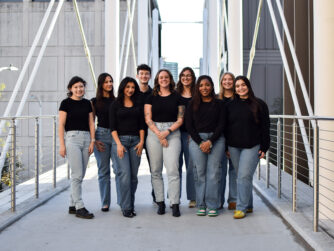When Heidi Schmalbach was first introduced to Planet Texas 2050, she didn’t know what to expect. The project launched just a few years prior as one of three “grand challenges” undertaken by the University of Texas to solve pressing world problems in new and innovative ways. Planet Texas is an eight-year research project to find solutions around the changing climate.
“We’re focused on the challenge of making Texas more resilient in the face of climate change, and also rapid population growth and urbanization,” Schmalbach said. “Those are twin challenges that have kind of compounding impacts on communities across the state.”
Schmalbach first entered academia as a graduate student in the Community and Regional Planning program before moving to New Orleans to pursue a Ph.D. at Tulane University while simultaneously working as a nonprofit executive. She moved back to Texas in 2020 and joined the Planet Texas team soon after.
“The Planet Texas opportunity came across my inbox somehow, and (I thought), wow, this is a really unique opportunity to continue to have that bridging role between nonprofit organizations, communities, stakeholders, and the research world,” Schmalbach said.
With an expiration date of 2027, they didn’t have time to waste. She was only the second person to fill the role of program director, and Planet Texas had just launched multiple new projects spanning across a variety of disciplines within and outside of UT Austin.
Planet Texas’ mission is simple. The group of researchers, creatives (shout out to The Drag’s podcasting team!), community members and project managers put their combined brain power toward finding and documenting ways for Texans to not just survive the climate crisis, but to bring to light the resilience and strength Texans past and present have used to overcome the worst of the environmental disasters we’ve faced for years.
“There’s no greater challenge, ultimately. The existential challenge is climate change,” Schmalbach said. “And it is compounded in Texas by the fact that we are growing very quickly, (and) we have a challenging political climate in which to implement anything. So being able to make progress here allows us to be a model for other places.”
The “Planet Texas” podcast isn’t the first interdisciplinary project the organization has launched. Under Schmalbach’s guidance, Planet Texas has designed networks for hazard preparedness and response, developed models that analyze data in new ways to predict future climate change disasters, and even hosted multiple symposiums dedicated to generating conversation surrounding Texan resilience.
“The idea is that (by) building these teams of researchers (as well as) community-based organizations, and stakeholder groups, those relationships will continue into the future, and that those collaborations, and, of course, the tools and knowledge out of that work will continue on as it gets implemented through policy and practice across the state,” Schmalbach said.
Because of Texas’ widely varying ecological environment, the state is uniquely positioned to feel harsher effects of a changing climate and implement innovative ways to respond and document Texan efforts.
One of those ways is through the “Planet Texas” podcast produced by The Drag Audio. Across five episodes that are all out now, host Aurora Berry narrates stories of Texan resilience, spanning from the Texas panhandle to the hurricanes of Houston.
“I love research. I love supporting research,” Schmalbach said. “Making sure that the data and tools that’s coming out of Planet Texas is clear, and available and accessible (is) one challenge. And that’s where The Drag really helps.”








